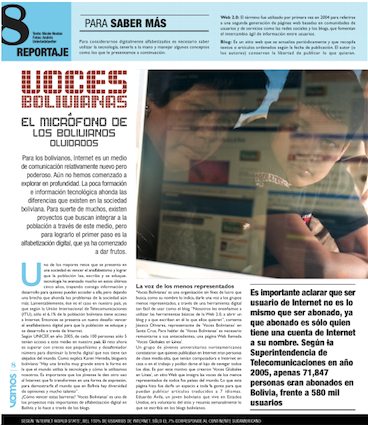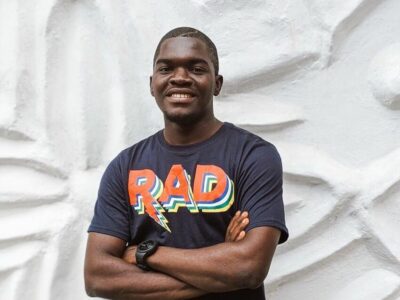Rising Voices aims not just to get new communities actively participating in the conversational web, but also to introduce their voices to mainstream media outlets so that, for once, under-represented communities are portrayed by their own residents. While the majority of the ten current Rising Voices outreach projects have been covered by mainstream media organization, Voces Bolivianas takes the prize when it comes to attracting national and international media attention. The citizen media outreach project, which trains new bloggers in El Alto, Santa Cruz, and other sites around Bolivia, has been featured in El Deber, the BBC, Argentina's La Nación, and OH! Magazine. They were featured yet again this week, this time in the Santa Cruz-based Vamos magazine.
The article by Nicole Nostas is titled “Voces Bolivianas: the microphone of the forgotten Bolivianas.”

Para los bolivianas, Internet es un medio de comunicación relativamente nuevo pero poderoso. Aún no hemos comenzado a explorar en profundidad. La poco formación e información tecnológica ahonda las diferencias que existen en la sociedad boliviana. Para suerte de muchos, existen proyectos que buscan integrar a la población a través de este medio, pero para lograrlo el primer paso es la aflabetización digital, que ya ha comenzado a dar frutos.
La voz de los menos representados
Voces Bolivianas es una organización sin fines de lucros que busca, como su nombre lo indica, darle una voz a los grupos menos representados, a través de una herramienta digital tan fácil de usar como el blog. “Nosotros les enseñamos a utilizar las herramientas básicas de la Web 2.0, a abrir un blog y a que escriban en él lo que ellos quieren”, comenta Jéssica Olivares, representante de Voces Bolivianas en Santa Cruz. Para hablar de “Voces Bolivianas” es necesario remontarse a sus antecedentes, una pagina Web llamada “Voces Globales en Línea”.
Un grupo de jóvenes universitarios norteamericanos constataron que quienes publicaban en Internet eran personas de clase media-alta, que tenían computadora e Interent en casa o en el trabajo y podían darse el lujo de navegar todos los días. Es por este motivo que crearon “Voces Globales en Línea, un sitio Web que integra las voces de los menos representados de todos lo países del mundo. Lo que esta página hizo fue darle un espacio a toda la gente para que puedan publicar artículos traducidos a 7 idiomas. Eduardo Ávila, un joven boliviano que vive en Estados Unidos, era voluntario del sitio y resumía semanalmente lo que se escribía en los blogs bolivianas.
Voces Bolivianas is a non-profit which aims, as its name suggests, to give under-represented groups a voice with easy-to-use digital tools like blogs. “We show them how to use the basic tools of the Web 2.0 – how to open a blog, and that they can write in it what they want,” comments Jessica Olivares, a representative of Voces Bolivianas in Santa Cruz. To speak about Voces Bolivianas, it is necessary to go back to its antecedent, a web page called Global Voices Online.
A group of young North American university students found that those who publish online were from middle-upper classes with their own computers and with internet access at home or at work, giving them the luxury of surfing the web every day. It was for this reason that they created “Global Voices Online”, a web site which gathers all of the least represented voices from around the world. What this site did was give a space so that people could publish articles which were translated into seven languages. Eduardo Ávila, a young Bolivian who lives in the United States, was a volunteer for the site and summarized every week what was written in Bolivian blogs.
“Creo que aquellos blogs no representaban la diversidad del país, por eso vimos la necesidad de que otros grupos entren al mundo “bloguero” para formar parte del diálogo en la blogosfera boliviana”, recuerda Ávila, que presentó un proyecto de alfebetización digital a Rising Voices, una organización que persigue los mismo fines. Voces Bolivianas logró ubicarse entre los 5 proyectos mundiales elegidos para recibir fondos. “Este proyecto es importante porque Internet es un lugar donde todos somos iguales, donde no importa si se trata de un empresario, un obrero, un político o una ama de casa. Todos tenemos las mismas oportunidades para expresarnos en un blog. Esta gratis y fácil de usar, solamente hay que tener un poco de conocimiento. “Voces Bolivianas” trata de difundir esa información para crear un puente entre las personas, sin generalizaciones y estereotipos”, comenta. Es así como él junto a Mario Durán y Hugo Miranda, empiezan a desarrollar un taller en la ciudad de El Alto, ya que querían darle a los alteños la oportunidad de contar su vida desde un punto diferente. En septiembre de 2007, Bolivia contaba con 23 nuevos blogueros alfabetizados y activos. Según Vania Valderram, bloguera voluntaria, los participantes tenían una actitud positiva todas las ganas que necesitan para abrir un blog y mantenerlo actualizado.
The article goes on to describe how Voces Bolivianas then expanded from El Alto to Santa Cruz where Jessica Olivares led a similar workshop series in the Plan 3000 neighborhood of Santa Cruz. You can download a PDF of Vamos magazine and read the entire article in its original Spanish from their website. You can also see the pictures of and read quotes from the diverse group of new bloggers trained by Voces Bolivianas including Pedro Velasquez, a 55-year-old professor, and Kevin Ayllón, a 13-year-old student. Even if you don't speak Spanish, you can still follow the latest featured posts by new bloggers from Voces Bolivianas on the English version of their website.




1 comment
UN-Alliance of Civilizations
Information and resources on
Media Literacy Education:
http://www.aocmedialiteracy.org